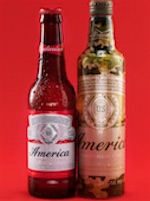Budweiser, which last year said it was re-labeling its beer “America” for the election season, is again using the word, raising the ire of those who say the company is based in Belgium and is dominated by Brazilian bankers.
“Budweiser calling itself ‘America’ is the most un-American thing I’ve observed in quite a while,” says Bill McCameron, micro-brewer who hosts brewstuds.com.
 |
Owner AB InBev is doing it because Budweiser is losing market share, he says. Its Achilles heel is the fact that they’re foreign owned while their core customers are red-blooded Americans, he adds.
Budweiser is still brewed in U.S. locations such as St. Louis and A-B InBev does employ Americans in those facilities, he notes.
However, he says “The lion’s share of the profits go overseas and are largely subject to a system designed by the Belgian government for the purpose of tax avoidance.” A European Union commission has ordered the company to recover $763 million from 35 different companies it says have taken part in illegal tax breaks.
AB InBev is accused of receiving shelter to 140 million euros of profit by sending the funds to a company that exists only on paper.
InBev’s advertising in the U.S. is handled by WPP’s MediaCom. It began a global media agency review earlier this year. Eight agencies that cover 50 countries are currently being used. Media Link is the search consultant. InBev is the 20th biggest U.S. advertiser with a budget of $1.68 billion.
Last year it acquired SABMiller for $103 billion. Brands included Miller, Foster and Pilsner Urquell. It was the second biggest brewer after InBev.
InBev said earlier this year it would end sponsorship of the U.S. Olympic team that dated to 1984 and included 16 Olympic games.
Foreign-owned A-B Hurts U.S. Brewers—McCameron
McCameron, saying that for him Budweiser “ceased being American” when it was sold in 2008, says that the company, “while draping itself in the American flag, is also attacking an entire industry and culture of real American entrepreneurs, American workers, and loyal American consumers.”
Budweiser ads, he notes, have paired the beer with such “quintessential American activities” as tailgating, grilling burgers, and watching basketball, baseball, American football and stock car racing. The brand sells about 100 million cases yearly.
What Budweiser seems to be saying, according to McCameron, is: See, we’re American. Bud is available at every sporting event, concert, BBQ and parking lot party. See, we’re American. Our product is so watered down, you can chug it between innings at your softball games. See, we’re American. Yeah, a lot of key decisions about our products are made in other countries or by people running multi-million dollar research campaigns. See, we’re…well, don’t pay any attention to that.“
McCameron says there is now “a vast selection of great, actually American, handmade beers” that is giving competition to A-B and the other major brewers. The current brewing techniques, science backing and available general information are far more advanced and accessible than they were when beer was on the decline in America a hundred or so years ago, he says.
A beer-drinker can drive or walk five minutes and have a chat with the person who brews fifteen different styles, each being a unique, beautiful creation in its own right, he says. “In this war, A-B is a large aircraft carrier, going the wrong way in the raging Pacific Ocean of a modern beer market defined by complexity and diversity, and here comes the 21st fleet of craft brewers on Sea-Doos passing it in the opposite direction. Good luck turning that ship around."
No Safe Level of Alcohol Consumption
“Drinks Makers Battle Loss of ‘Health Halo,’” said a front page headline in the Aug. 22, 2016 Wall Street Journal that quoted U.K. Chief Medical Officer Sally Davies as saying, “There is no safe level of drinking.”
Alcohol consumption raises the risk of certain cancers, said the U.K. government which issued new guidelines in January that “weakened” 20-year-old advice that moderate drinking could benefit the heart.
The U.S. Dept. of Health and Human Services in January removed similar advice from its guidelines.
“For decades,” said the WSJ article by Justin Scheck and Tripp Mickle, “beer, wine and liquor producers have been helped by a notion, enshrined in a number of governments’ dietary advice, that a little alcohol can provide modest coronary and other health benefits.”
New Guidelines Upset Alcohol Sellers
“We can’t let them gain traction,” Beer Institute president Jim McGreevy told an April conference. Brewer Anheuser-Busch InBev and Diageo are joining Heineken and Pernod Ricard in a $55.4 million study of 8,000 subjects 50 and over that will take about six years. It will contrast health of alcohol users and abstainers.
InBev, which had revenues of $43.6 billion in 2015, invited controversy by winning permission, for this summer, to feature the name “America” on its cans and bottles. “It’s hard to imagine a more patriotic label, particularly for a brand that’s not even technically American,” said the Washington Post May 10, noting that A-B was bought in 2008 by InBev, a beer conglomerate based in Belgium and Brazil. InBev wants to emphasize that Budweiser beer is brewed in the U.S.
A leader in the battle to reduce alcohol consumption is the World Health Organization which called drinking harmful in a population-wide scale, “even when consideration is given to the modest protective effects, especially on coronary heart disease, of low consumption of alcohol for some people aged 40 years or older,” said the WSJ article.
The U.K. guidance said health benefits are “less and apply to a smaller group than previously thought,” potentially reducing death risks only to women over 55.
The alleged myth of two drinks for men and one for women daily being healthful traces to a study 40 years ago by California cardiologist Arthur Klatsky who found that light drinkers had fewer heart attacks than abstainers.
Up until 1995, the U.S. Dept. of Health and Human Services said alcohol had “no net health benefit” and that drinking “is not recommended.” This was changed to a statement that moderate drinking was linked to less coronary heart disease in some people.
“One Drink Is Good” Finding Was Flawed
Health advocates say that “moderate drinkers” may be more concerned about their health than heavier drinkers and this may account for the lower rate of heart disease. Even light drinking is associated with a higher risk of certain forms of cancer, says the WSJ, quoting “public health officials.”


 Abandon traditional content plans focused on a linear buyer progression and instead embrace a consumer journey where no matter which direction they travel, they get what they need, stressed marketing pro Ashley Faus during O'Dwyer's webinar Apr. 2.
Abandon traditional content plans focused on a linear buyer progression and instead embrace a consumer journey where no matter which direction they travel, they get what they need, stressed marketing pro Ashley Faus during O'Dwyer's webinar Apr. 2. Freelance marketers and the companies that hire them are both satisfied with the current work arrangements they have and anticipate the volume of freelance opportunities to increase in the future, according to new data on the growing freelance marketing economy.
Freelance marketers and the companies that hire them are both satisfied with the current work arrangements they have and anticipate the volume of freelance opportunities to increase in the future, according to new data on the growing freelance marketing economy. Home Depot's new attempt to occupy two market positions at once will require careful positioning strategy and execution to make it work.
Home Depot's new attempt to occupy two market positions at once will require careful positioning strategy and execution to make it work. Verizon snags Peloton Interactive chief marketing officer Leslie Berland as its new CMO, effective Jan. 9. Berland succeeds Diego Scotti, who left Verizon earlier this year.
Verizon snags Peloton Interactive chief marketing officer Leslie Berland as its new CMO, effective Jan. 9. Berland succeeds Diego Scotti, who left Verizon earlier this year.  Norm de Greve, who has been CMO at CVS Health since 2015, is taking the top marketing job at General Motors, effective July 31.
Norm de Greve, who has been CMO at CVS Health since 2015, is taking the top marketing job at General Motors, effective July 31.


 Have a comment? Send it to
Have a comment? Send it to 
No comments have been submitted for this story yet.